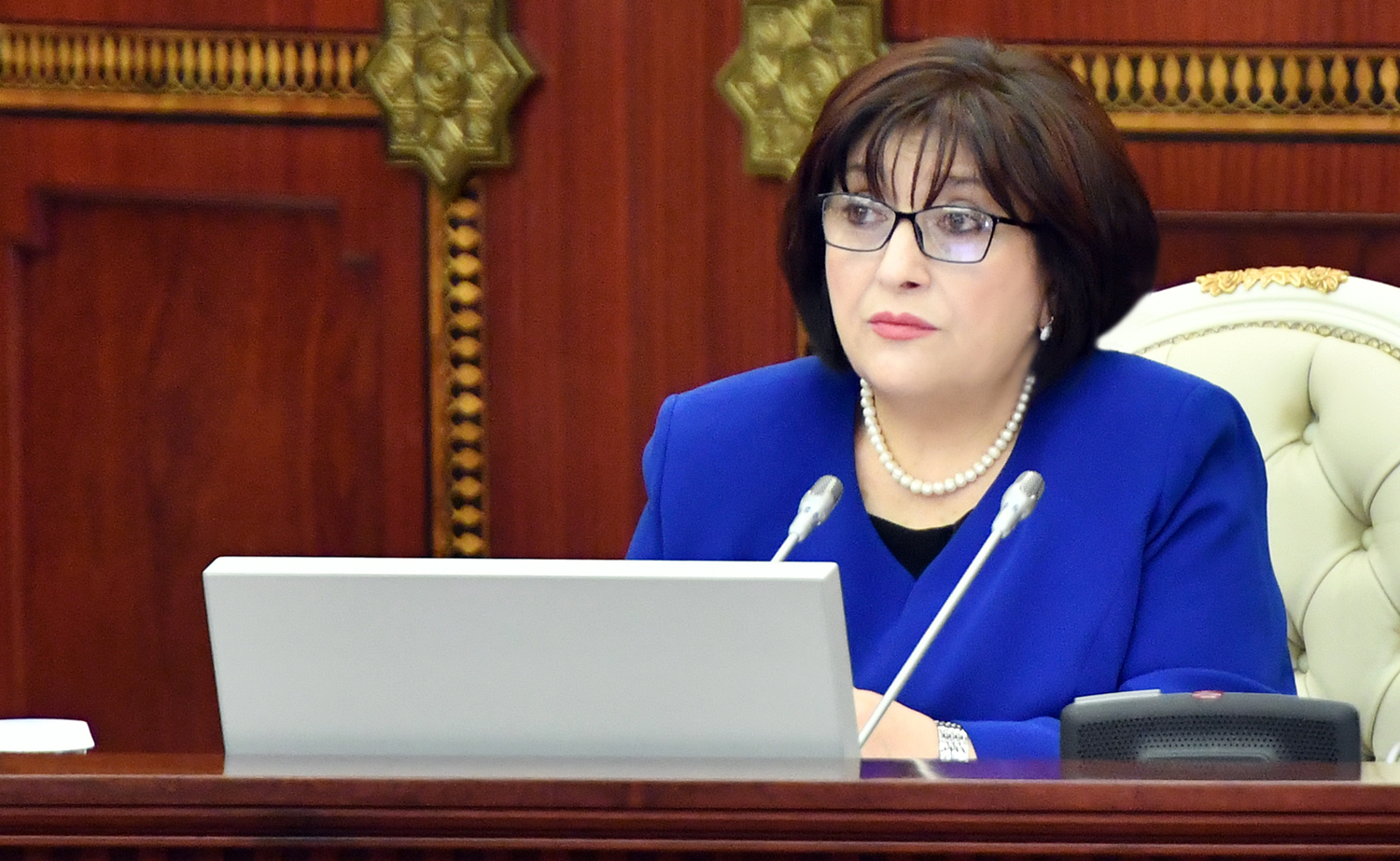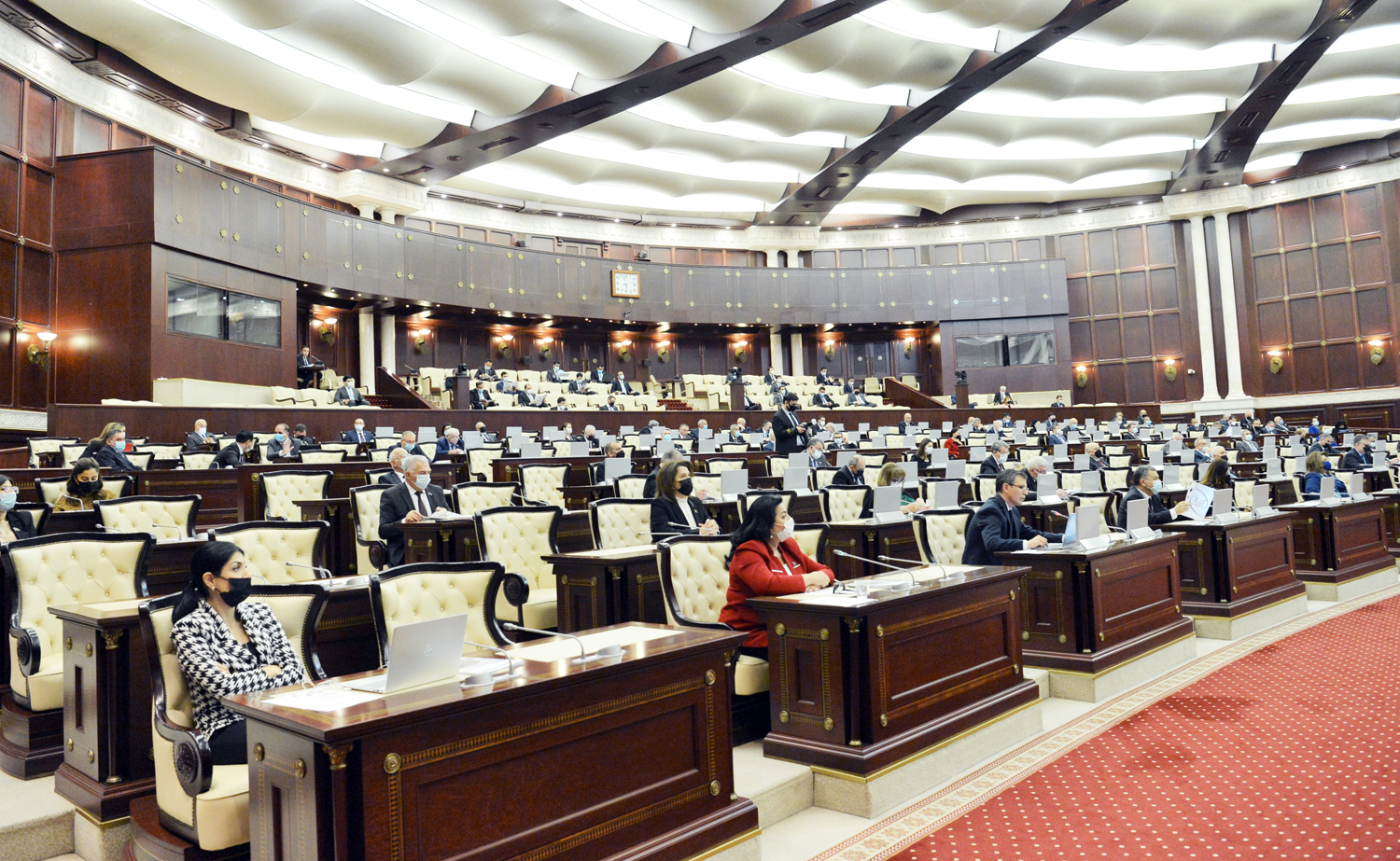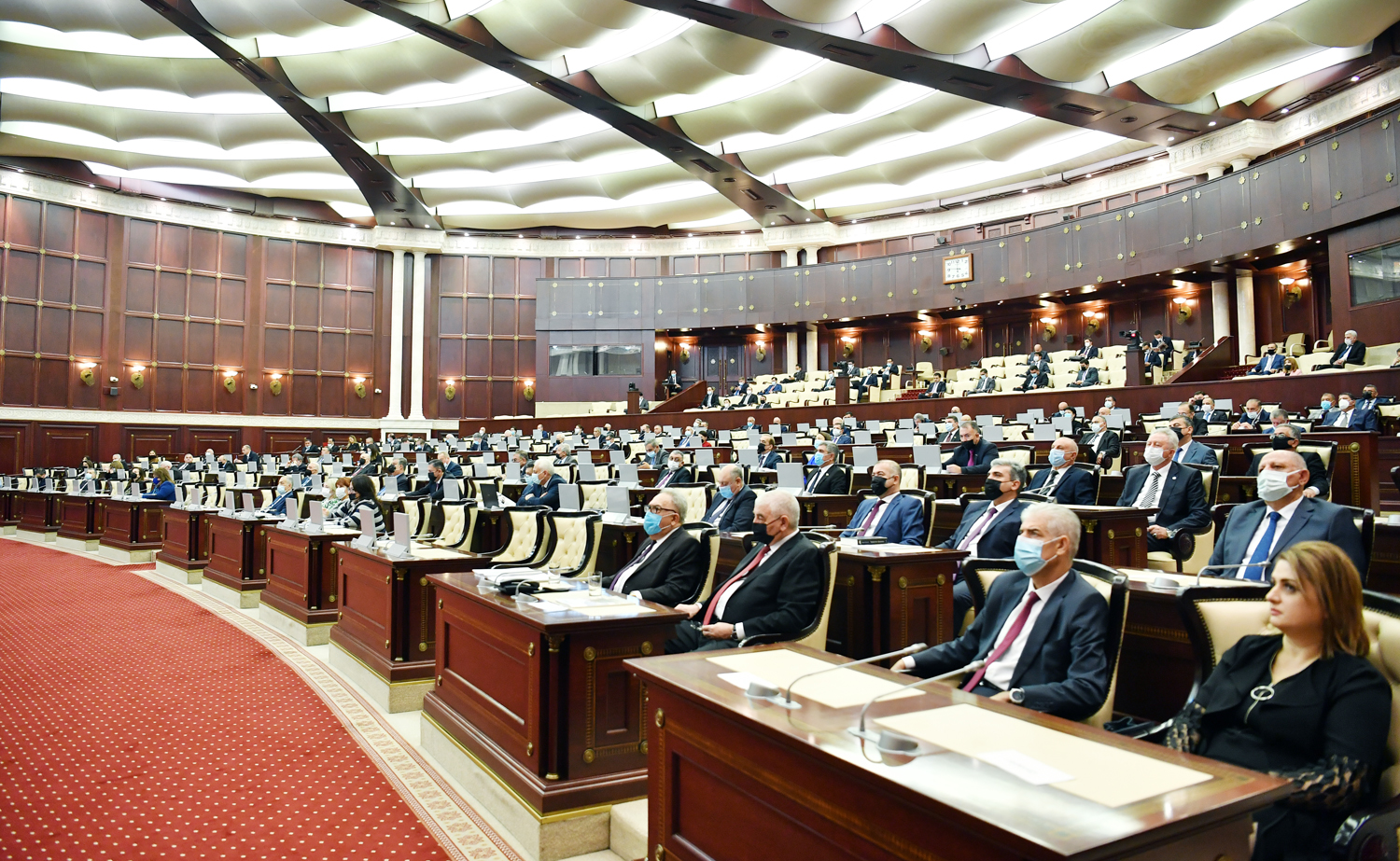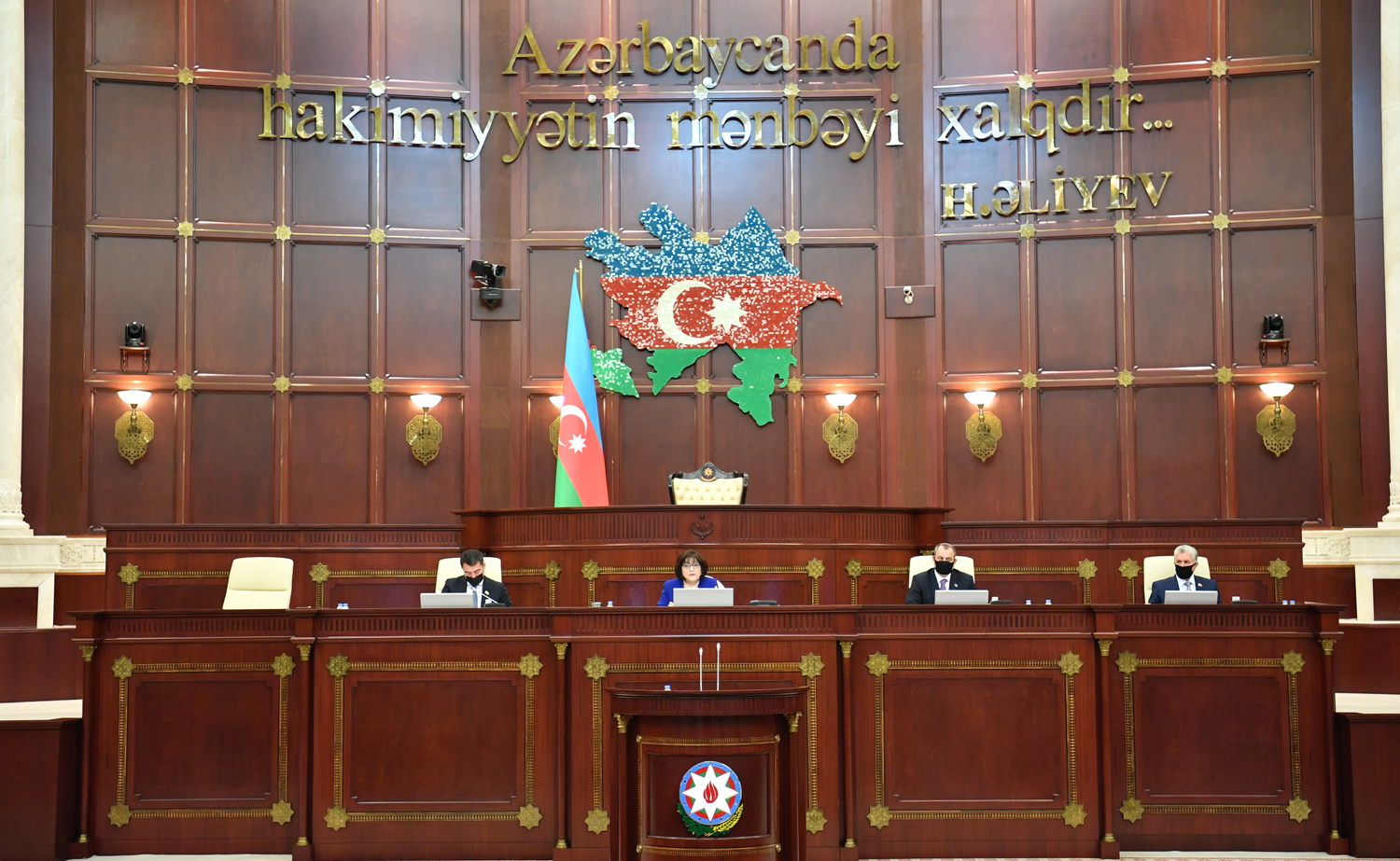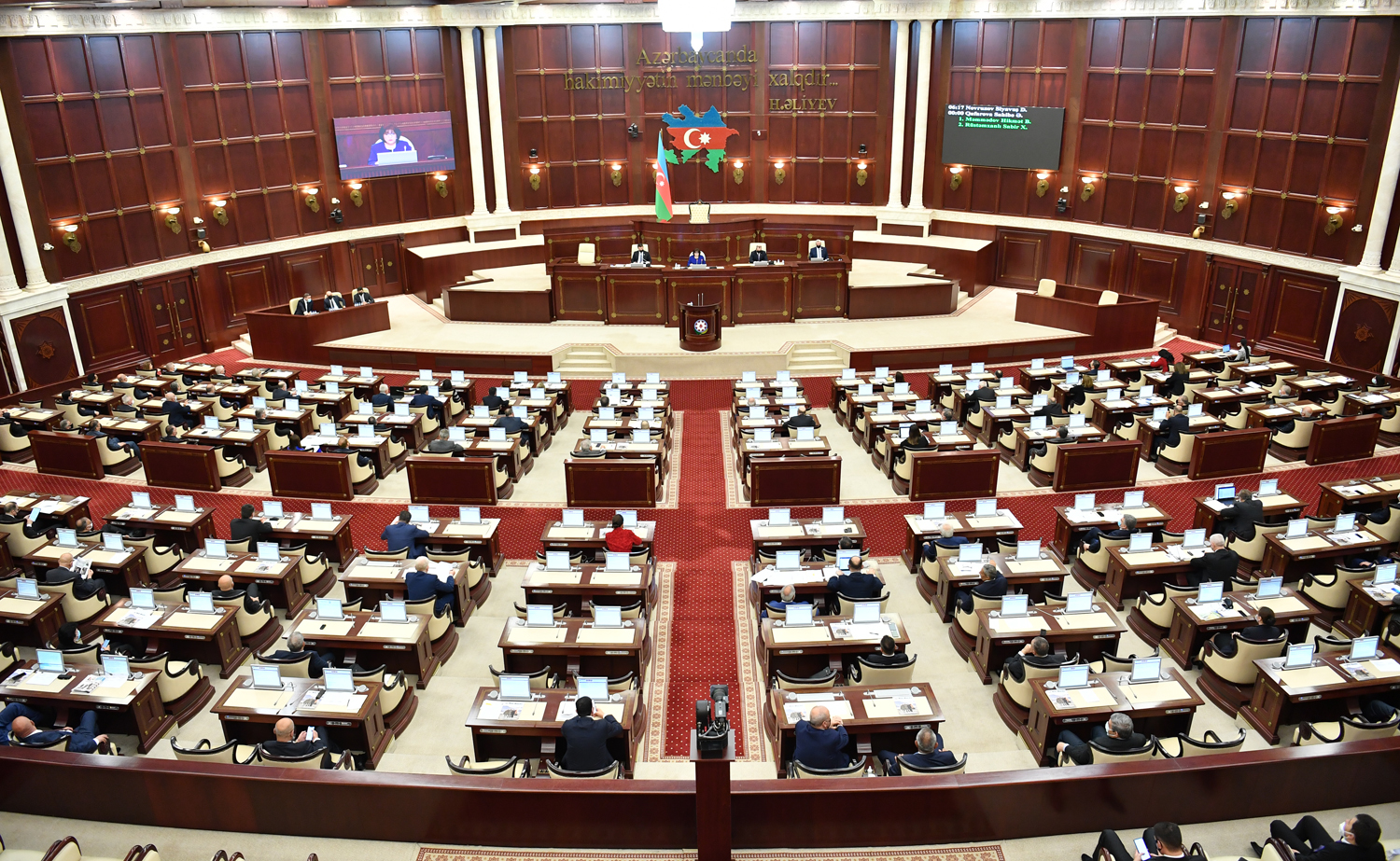Chair of Milli Majlis Sahiba Gafarova Reacted to the Fictitious ‘Armenian Genocide’ Claims at the Parliament’s Plenum
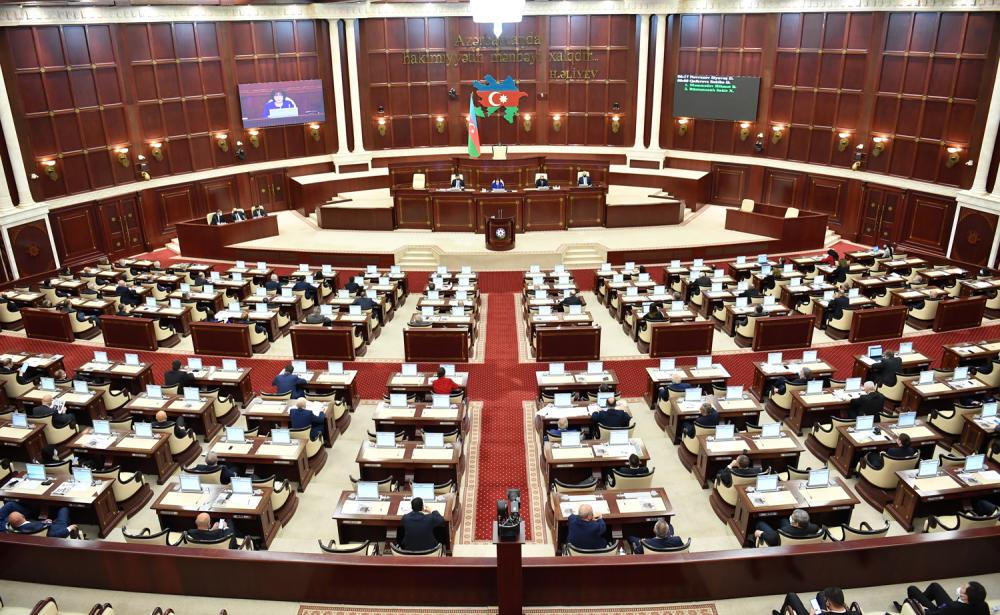
Chair of the Milli Majlis Sahiba Gafarova reacted to the recent claims of the fictitious ‘Armenian genocide’ at the scheduled plenary session of the Parliament held on 27 April.
Madame Chair said that the claims of a genocide to which Armenians were allegedly subjected 106 years ago had caused tensions between Turkey and the United States of America.
‘We have more than once been able to witness the attempts of the Armenian chauvinists and their patrons to rewrite history, forge facts and pass lies for truth in order to don the tall tales of the ‘Armenian genocide’ politically and legally. However, historical facts and documents prove that the coinage of a planned annihilation of Armenians within the territory of the Ottoman State is nothing other than nonsense. The same conclusion is drawn in the research done by a number of historians including the American scientists Stanford J Shaw, Justin A McCarthy and Bernard Lewis,’ Madame Chair was saying.
The Armenian chauvinists destroyed hundreds of thousands of innocent people – Turks, Azerbaijanis and members of other nations – en masse in the same period in which it is alleged the ‘Armenian genocide’ occurred, namely, at the dawn of the twentieth century, Sahiba Gafarova continued.
Besides, the genocidal crimes were arranged stage-by-stage in both Anatolia and the South Caucasus. The 1918 acts of genocide aimed at the Azerbaijani people were more concerted and carried out with yet greater atrocity. In March and April that year, Armenians killed more than 50,000 Azerbaijanis in Baku, Shamakhi, Guba, Mugan and Lankaran. Their houses were looted and sacked. Tens of thousands more were evicted from their homes. The genocide did happen, indeed, only, it was committed by the Armenian gangs of bandits while the victims were Azerbaijanis and people of the other nations.
In the rather recent past, too, the Armenian armed forces committed an act of genocide in the Azerbaijani town of Khojali – that was on 26 February 1992. That ghoulish crime killed 613 Azerbaijani townsfolk brutally owing to their ethnic background. Besides, 487 people were crippled, 1,275 more were captured and subjected to blood-curdling tortures while nothing is known to date of the fate of 150 more including 68 women and 26 children.
Madame Speaker emphasised that it is only regrettable that those who blink at the true genocide committed in Khojali would, either from the Armenian influence or seeking to secure certain political dividends, take the liberty of making statements about the false ‘Armenian genocide’.
On the other hand, the Spokesman of the United Nations Secretary-General Stéphane Dujarric remarked whilst laying down a blueprint for recognition of the invented ‘Armenian genocide’ a few days ago that the fact of ‘genocide’ would solely have to be established as such by an appropriate judicial instance.
This, then, is the United Nations’ attitude to the issue of the ‘genocide’.
Speaking of judicial instances, the European Court of Human Rights affirmed in its verdicts in the ‘Doğu Perinçek against Switzerland’ case passed in 2013 and 2015 that the expression ‘the Armenian genocide’ was an idea but not a fact of history.
The Chair of the Milli Majlis also recalled that the Turkish State had made open its Ottoman Period archives with everyone interested including Armenian politicians and researchers having been invited to acquaint themselves with the files. Why, it was no coincidence that the Armenian side ignored that call to a sound discussion.
According to Sahiba Gafarova, the Azerbaijani State and the people of Azerbaijan stand by the fraternal Turkey in this matter as they will in any other subject-matter. President Ilham Aliyev of the Azerbaijan Republic reiterated this stance in his latest phone conversation with President Recep Tayyip Erdogan of the Turkish Republic. President Aliyev demonstrated once again that the brotherly state was right by Turkey’s side in the face of the campaign concerning the fictitious ‘Armenian genocide’ waged against Turkey – as the brotherly state does in all other situations.
The Ministry of Foreign Affairs of Azerbaijan stated its categorical viewpoint of the case. Besides, the 48 political parties that are active in the country came up with a joint declaration.
Madame Chair remembered that she had assured the Turkish side of the solidarity of the Milli Majlis of the Azerbaijan Republic with them during her phone call to Chairman of the Great National Assembly of Turkey Mr Mustafa Şentop on 24 April. She had said then that the peace and comprehensive co-operation opportunities emerged in the region of late and the hopes pinned on them could be dashed by such declarations.
The Chair of the Milli Majlis also referred to the one-sided and biased statements and the accusations levelled against Azerbaijan that the chairman of the French Senate Gerard Larcher had made whilst visiting in Armenia a few days ago. Had the chairman of the French Senate truly been impartial and fair, Madame Speaker commented, he would not have remained blind to Armenia having razed Azerbaijani towns, villages, religious and cultural sites to the ground and desecrated our sanctuaries during the thirty years of occupation. It is such pity, Sahiba Gafarova added, that Mr Larcher had not taken such a standpoint but had preferred to make incendiary proclamations instead.
The agenda of the sitting was adopted then. Discussions of the current issues began. The parliamentary committee chairman Zahid Oruj and the MPs Azer Badamov, Soltan Mammadov, Sahib Aliyev, Vahid Ahmadov, Javid Osmanov, Fazil Mustafa, Ali Masimli, Elshad Mirbashiroglu and Gudrat Hasanguliyev commented on the US President Joe Biden’s statement about the trumped-up ‘Armenian genocide’. The MPs criticised it sharply and dismissed it as a historical lie. They also characterised the biased and far-from-objective claims of the French Senate’s chairman Gerard Larcher as a threat to stability in the region. It was emphasised in the speeches that Azerbaijan was always by Turkey’s side.
The agenda items were covered afterwards.
Chair Gafarova announced the forthcoming deliberations upon the eight agenda items with two of them being draft resolutions of the Milli Majlis. She went further to inform the House of the first item being about election of the active and standby members of the Central Electoral Commission of the Azerbaijan Republic. The former CEC members’ tenures are out, so, the Milli Majlis is to form the new make-up of the Commission. It is pursuant to Article 24.3 of the Electoral Code that, of the 18 CEC members, 6 candidatures must be canvassed by political parties commanding a majority in the Milli Majlis, 6 by the MPs who do not belong to any political party and a further 6 by political parties constituting the parliamentary minority. At the same time, it is stipulated in Article 19.7 of the Electoral Code that the 3 standby member candidate nominations must be submitted to the Milli Majlis in precisely the same order.
Madame Speaker told of the completion of all the relevant procedures and the finalised nomination of candidates. The Board of the New Azerbaijan Party commanding the parliamentary majority had submitted 6 full-member and 1 standby-member candidatures. The assembly of the independent MPs had identified and presented their 6 full-member and 1 standby-member candidatures and the governing bodies of the Milli Majlis minority political parties had offered the 6 full-member and 1 standby-member candidatures of their own. Those minority parties are the Whole Azerbaijan’s Public Front Party, the Civil Solidarity Party, the Great Order Party, the Democratic Enlightenment Party of Azerbaijan, the ‘Ana Veten’ Party and the Party of Democratic Reforms.
Sahiba Gafarova mentioned also that, in keeping with the requirements of the Electoral Code, one of the candidates proposed by the independent MPs had been accommodated with representatives of the majority party (the ‘New Azerbaijan’) and another with members of the minority parties.
The parliamentary committee chairman Siyavush Novruzov and the MPs Hikmat Mammadov and Sabir Rustamkhanli offered their considerations during the debate. The Draft Resolution was approved and adopted then.
The CEC member Mazahir Panahov thanked the sides having offered candidates and the Members of the Milli Majlis. He said that there had been considerable achievements in the electoral realm in Azerbaijan just as in the other fields of late. Those particular achievements are firstly associated with the socio-political stability maintained in the country and, secondly, with the development of a legal foundation fully in line with the demands of the time that ensures democratic and transparent elections. Thirdly, Mr Panahov continued, there is the exemplary working environment created for the more than thirty thousand members of the electoral commissions – including those of the Central Electoral Commission. The executive authorities are carrying into life and keep in their focus all that at the initiative and under the direct control of the Head of the State. Mr Panahov said with confidence that the CEC would go on working in compliance with the legislative requirements and in the interest of the state and people of Azerbaijan.
The next agenda item up concerned the Charter of the Parliamentary Assembly of the Economic Cooperation Organisation (ECO PA); the relevant resume came from Deputy Chair of the Milli Majlis Committee for International Relations and Interparliamentary Connections Sevinj Fataliyeva.
Mrs Fataliyeva reminded the House that, established in 1985, the ECO is an interstate organisation pursuing the goal of tightening the economic, technical and cultural co-operation amongst Turkey, Iran and Pakistan from day one. Seven more states, namely, Azerbaijan, Afghanistan, Kazakhstan, Kyrgyzstan, Uzbekistan, Tajikistan and Turkmenistan, joined the ECO in 1992. The Izmir Treaty is the principal governing document that regulates the workings of the ECO. The main goals of the ECO consist in maintaining economic co-operation, eliminating trade barriers in the ECO region and broadening regional and interregional trade whilst taking into account the experience accumulated in other regions as well as global economic tendencies.
Azerbaijan hosted the ECO summits in 2006 and 2012.
President Recep Tayyip Erdogan of Turkey chaired the 14th ECO summit on 4 March this year where President Ilham Aliyev of Azerbaijan witnessed the great importance that our country attaches to furthering its relations with the other ECO member-states.
Adopting the ECO PA Charter and incepting the Assembly add up to a business that is of especial importance given the new realia taking hold in the region, Mrs Fataliyeva concluded.
The parliamentary committee chairman Musa Guliyev and the MPs Vahid Ahmadov, Fazail Agamali, Ilham Mammadov and Aydin Mirzazade shared their views of the Charter of the ECO PA.
Next, the document was put on vote and approved.
A member of the Milli Majlis Committee for Law Policy and State-Building Amina Agazade tabled the third reading of the draft amendments to the Law ‘On the Prosecution Authorities’. She also clarified the matters referenced by the MPs in the course of the second reading.
The committee chairman Siyavush Novruzov commented on the draft; then, the Bill was voted on and approved in the third reading.
Amina Agazade also informed the House of the third-reading draft amendments to the Law ‘On Serving in the Prosecution Authorities’, saying that they consisted in the new provisions about on-the-job training and probation periods in the legal prosecution system as well as about early advances in rank of prosecution officers. In addition, she said, the amendments would serve to improve the social security of the personnel.
The Bill was voted on, and approved in the third reading.
Deputy Chair of the Milli Majlis and Chairman of the parliamentary Committee for Public Associations and Religious Entities Fazail Ibrahimli tabled the draft amendments (in the second reading) to the Freedom of Faith Law. Mr Ibrahimli specified that the Bill was in full compliance with the second-reading postulations.
The amendments submitted for consideration are intended to bring about a more efficient legislative regulation of the existing as well as emerging relations in that field, define the relevant rights, obligations and responsibilities of the state, its citizens and religious entities, ensure there is an environment more favourable for execution of the freedom of faith, control the legal compliance and provide for efficient organisation of the enlightenment activities. Besides, the amendments are going to help strengthen the mutual respect, understanding and tolerance amongst the different faiths, according to Mr Ibrahimli.
The Bill was put on vote and approved in the second reading.
Next, First Deputy Chair of the Milli Majlis and Chairman of the parliamentary Committee for Law Policy and State-Building Ali Huseynli came up with the draft amendments (in the second reading) to the Code of Administrative Offences. He said that the document he had tabled had been drawn up in connection with enforcement of the amendments to the Freedom of Faith Law and contained unifying amendments.
The MPs voted on the Bill; it was approved in the second reading.
Speaker Sahiba Gafarova declared the two last agenda items and remarked that they the Bills were interrelated substantively.
Chairman of the parliamentary Health Committee Ahliman Amiraslanov told the House of the following documents:
The Bill (in the second reading) containing amendments to the Azerbaijan Republic Laws ‘On the State Care of Diabetes Mellitus Patients’, ‘On Blood and Blood Component Donation, and the Blood Service’, ‘On the Prevention of Neglect of Adolescents and of Juvenile Offences’, ‘On the Azerbaijani Red Crescent Society’, ‘On the Apiary Sector’, ‘On the Social Adaptation of Persons Relieved of Penitentiary Sentence Service’, ‘On Education’, ‘On Physical Education and Sports’, ‘On Cession of Lands for State Needs’, ‘On Countering the Diseases Caused by the HIV’ and ‘On the Prevention of Household Violence’;
And the Bill (in the second reading, again) containing amendments to the Azerbaijan Republic Laws ‘On the State Care of Multiple Sclerosis Patients’, ‘On the Protection of the Rights and Liberties of Persons Held in Detention Facilities’, ‘On the Protection of Green Spaces’, ‘On the Compulsory Clinical Examination of Children’, ‘On Limiting the Consumption of Tobacco Goods’, ‘On Vocational Education’, ‘On the Rights of Disabled Persons’, ‘On the Psychological Aid’ and ‘On General Education’.
Those Bills are prepared to ensure the enforcement of the Decree No 418 dated 20 December 2018 of the President of the Azerbaijan Republic ‘On a Number of Measures to Ensure the Implementation of the Compulsory Medical Insurance in the Azerbaijan Republic’.
In the thorough discussion that followed, the MPs Gudrat Hasanguliyev, Fazail Agamali and Hikmat Mammadov stated their relevant views and asked questions about the coronavirus pandemic, production of the coronavirus vaccine and vaccination in our country. Ahliman Amiraslanov gave exhaustive answers to their questions.
Both Bills were voted through the second reading one after another, at which point the ordinary plenum of the Milli Majlis was over.
The Press and Public Relations Department
The Milli Majlis



